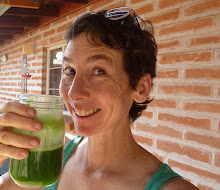I have copied and posted the following article from Union for Reform Judaism for my reference/archive for future writing and artwork that I will do. I have much first-hand experience in living within a sukkah and with great faith and trust that I am always Divinely supported. We all are.
"During the days of Sukkot, tabernacles, our tradition calls us to leave the security and comfort of our homes and to live in transitional and fragile huts in memory of the journey of the Israelites through the Sinai desert on their way to the Promised Land. The sukkah is an intriguing symbol of faith; as we sit in the sukkah, with only leaves for a roof, exposed to the wind, the rain and the cold, we become aware of our fragility in the face of the forces of nature and our dependence on it."
* * *
“You shall live in booths seven days; all citizens of Israel shall live in booths, in order that future generations may know that I made the Israelite people live in booths when I brought them out of the land of Egypt, I the Lord your God”. (Leviticus 23:42-43)
During the days of Sukkot, tabernacles, our tradition calls us to leave the security and comfort of our homes and to live in transitional and fragile huts in memory of the journey of the Israelites through the Sinai desert on their way to the Promised Land.
The sukkah is an intriguing symbol of faith; as we sit in the sukkah, with only leaves for a roof, exposed to the wind, the rain and the cold, we become aware of our fragility in the face of the forces of nature and our dependence on it. Sukkot also symbolizes the moment in the agricultural year cycle when we celebrate and enjoy the fruits of our summer’s hard labor. Enjoying the fruits of our hard labor is a gratifying experience. Our society today is not primarily agricultural but we can still relate to these ideas metaphorically and drew some relevant insights for our times. This fascinating juxtaposition between feeling empowered and vulnerable creates a healthy tension that protects us from vanity and teaches us a lesson in modesty. It can also teach us how to be good hosts. While guests are an important part of the Jewish home all year round, they are even more so during Sukkot. We are commanded to celebrate with the members of our community and especially with those who are more vulnerable and deprived. Once the comfort of sitting in the sukkah is challenged by the weather, hosts become aware of their own vulnerability and the differences between hosts and guests blur. These insights are subtle reminders that the ties that could unite us are stronger and richer that the conditions that differentiate us from each other. We should cherish this message by creating together opportunities for genuine encounters. One of the rituals of Sukkot that originated from the Zohar is to host in our sukkah the ushpizin. The ushpizin (“guests”) are seven symbolic guests who come to visit us in the sukkah, one for each of the seven days of the festival: Abraham, Isaac, Jacob, Moses, Aaron, Joseph, and King David. These symbolic guests enrich our sukkah with the presence of the Jewish tradition. The presence of the symbolic and human guests in our sukkah is a vivid testament to the power of the human spirit to survive - even thrive - in the midst of uncertainty. When the Israelites traveled in the desert God protected them and “made the Israelite people live in booth”. With every gust that we welcome in our sukkah we reenact this episode thus fulfilling our Jewish calling.
“A Jewish man remembers the Sukkah in his grandfather's home.
And the Sukkah remembers for him
The wandering in the desert that remembers
The grace of youth and the Tablets of the Ten Commandments
And the gold of the Golden Calf and the thirst and the hunger
That remember Egypt.”
And the Sukkah remembers for him
The wandering in the desert that remembers
The grace of youth and the Tablets of the Ten Commandments
And the gold of the Golden Calf and the thirst and the hunger
That remember Egypt.”
(“The Jews” by Yehuda Amicahi)
Sukkot is also a reminder of the journey of the Israelites through the Sinai desert on their way to the Promised Land. The sukkah is a transitional home, and as such it reminds us of our journey, its experiences, its challenges and its accomplishment, and above all its destination. How present is Israel in our experience during Sukkot?
The journey to Israel has been a spiral journey for many Jews; and with every visit we deepen our connection to Israel and its people. Like the Israelites during their journey, we experience moments of strong connection to and yearning for Israel and at times we have doubts and feel perplexed. But we know that we should always be on this journey to Israel. As Yehuda Amichai reminds us in his poem, Sukkot is also a moment of revisiting our history as individuals, allowing the history of our family to resonate with us. Through these memories and experiences, we strengthen the connections between the People of Israel, God and Israel.
Yehudit Werchow is the Central Shlicha of the Union for Reform Judaism and a student in the Israel Rabbinic Program of Hebrew Union College.


No comments:
Post a Comment